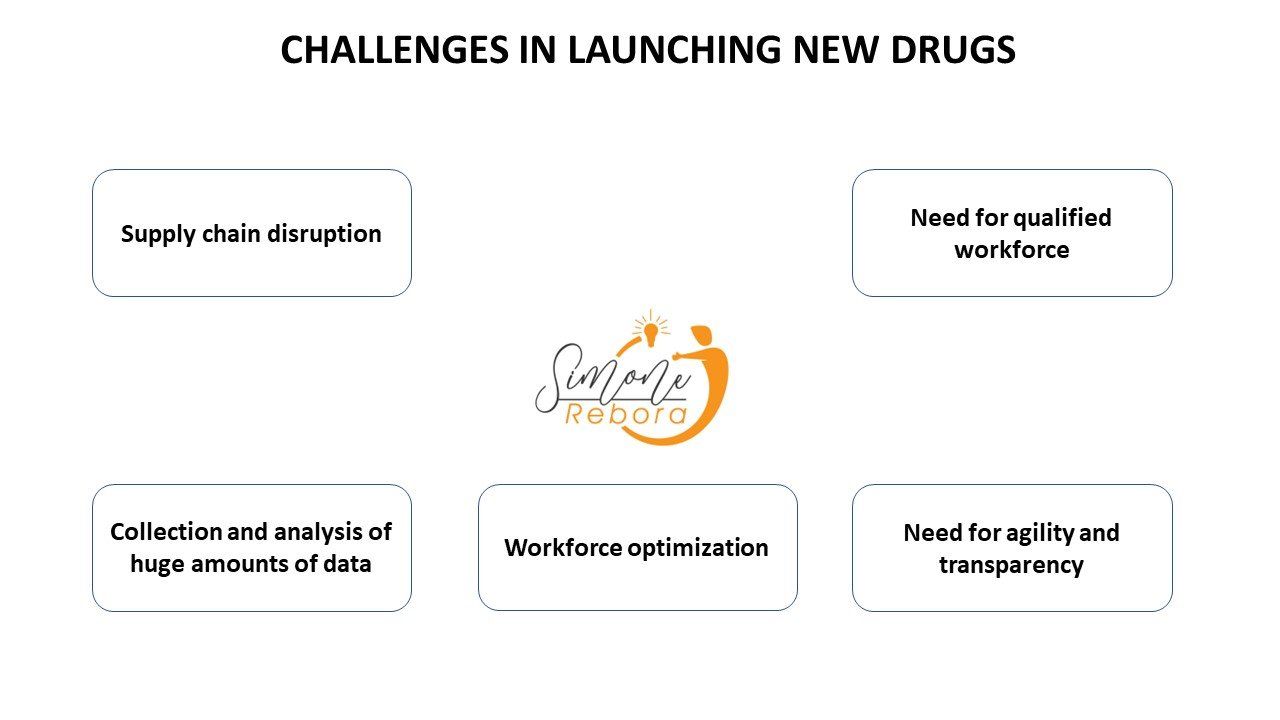CHALLENGES IN LAUNCHING NEW DRUGS
The pharmaceutical industry is economically and socially critical. However, it constantly faces multiple challenges that question the sustainability of several companies. Even before the pandemic, launching a new brand was far from straightforward. A successful launch must overcome a series of barriers, including supply chain, intensifying competition, increasing pricing pressure, increasing market entry barriers, and rising expectations among caregivers and patients.

The pharmaceutical industry is economically and socially critical. However, it constantly faces multiple challenges that question the sustainability of several companies. Even before the pandemic, launching a new brand was far from straightforward. The huge portion of worldwide drug launches between 2009 and 2017 failed to meet their two-year sales forecasts. A successful launch must overcome a series of barriers, including supply chain, intensifying competition, increasing pricing pressure, increasing market entry barriers, and rising expectations among caregivers and patients. The pandemic and its economic consequences have added further complications to what was already a risky launch environment.
1. Supply chain disruption
Every industry faces supply chain issues. Supply chains have witnessed an unprecedented disruption all around the world. In fact, this represents one the biggest challenges facing the pharmaceutical industry.
Even though pharmaceutical companies’ managers constantly seek to improve processes for maximum efficiency, technical contingencies might unfortunately cause a delay in the entire sector. Hence, to reduce challenges of their supply chain, they change their strategy and make the best use of their resources, internally and externally.
Even though we are in the midst of the digital age, it is important that companies invest in monitoring software to improve efficiency and project management. In general, the monitoring software will help you see where your products are and their supply chain status. It also helps to predict potential problems and opting for this software will also play a role in improving accountability, helping to avoid counterfeit products to be marketed. Project Management defines the application of a structured process and set of tools for leading the people side of change to achieve a desired outcome.
2. Need for qualified workforce
In order to define qualified workforce, we can say that it concerns people who carry out technical or intellectual work that requires thorough knowledge in a particular field of discipline. It should be noted that work productivity within an industry depends on the level of qualification of the workforce.
Relying on qualified people is even more one of the essential elements that ensures a promising future in the pharmaceutical industry. In fact, the pharmaceutical industry needs highly qualified workforce that has significant knowledge, experience, and skills. The sector has to increase its investment in highly qualified people to continue to grow.
Training the workforce helps to acquire the necessary skills to ensure, enhance and improve their participation in daily tasks. This will also help to fill in the skills’ gaps. The training should focus on technical knowledge applied within the company.
This is about one of the essential factors that play a substantial role in improving the company’s productivity. Indeed, the more the employee is trained, the more they become productive.
3. Collection and analysis of huge amounts of data
It should be noted that data is a true pillar in industry 4.0 or better, data is the new gold or oil. Indeed, it will allow to better control aspects of the company.
In the pharmaceutical industry, data refers to all the information entered by technicians or generated by machines. It should be noted that data collection and data quality are the crucial elements for every industry that aspires to face competition. In addition, the importance of data collection lies in the companies’ ability to perform analysis that can guide decision making.
Pharmaceutical industries are exposed to complex risks concerning drug approval, quality control, supply chain or even the different global commercial practices. To do this, pharmaceutical industry operators need agile tools in order to gather and manage data well while creating action plans.
Every pharmaceutical industry can collect data at several levels including maintenance, production and quality service. This step has to be digitalized in order to be easily exploited.
However, data collection and quality should be planned. In fact, this will help to avoid wasting resources. Whether to feed continuous improvement processes or to set up maintenance planning, the data collected must be stocked and studied.
4. Need for agility and transparency
In its primary meaning, agility refers to skill and vivacity. These are two characteristics that companies want to integrate into their daily operations. In the pharmaceutical sector, there is a growing need for faster, more accurate and transparent operations in all the fields.
We find 4 fundamental values to increase the sense of agility within the company.
- The team: You should know that the team is more important than tools or even working procedures. In fact, it is essential to build a cohesive and communicating team rather than having a team of experts working in isolation.
- Collaboration: It is also important to involve the customer in development. In the agile perspective, we must not neglect the customer’s demands.
- Change management: Moreover, initial planning and the product structure must be flexible in order to allow the evolution of the customer’s demand throughout pharmaceutical manufacturing.
- The product or the service: Finally, it is important that the product meets the implemented standards and the outcomes.
5. Workforce optimization
Optimizing workforce refers to all the commercial strategies aiming to improve the efficiency of employees and operations. It should be noted that in pharmaceutical industry, optimizing workforce maximizes the employees’ benefits and thus maintains efficiency.
When it comes to batch production through batch folders, the pharmaceutical industry is sometimes obliged to implement new standard operating procedures in operations and quality. The turbulence of the past few months has made pharma companies keenly aware of the need to rethink their medical education, engagement channels, and platforms—but it has also left some of them paralyzed by uncertainty. Should they invest now in transforming their commercial model or wait to see how things play out? As commercial leaders consider their go-to-market plans for new drugs, they have a unique opportunity to experiment with new approaches without disrupting their entire business model. Innovations developed for new drugs that prove valuable for commercial success will reshape the commercial strategy of the whole company.



